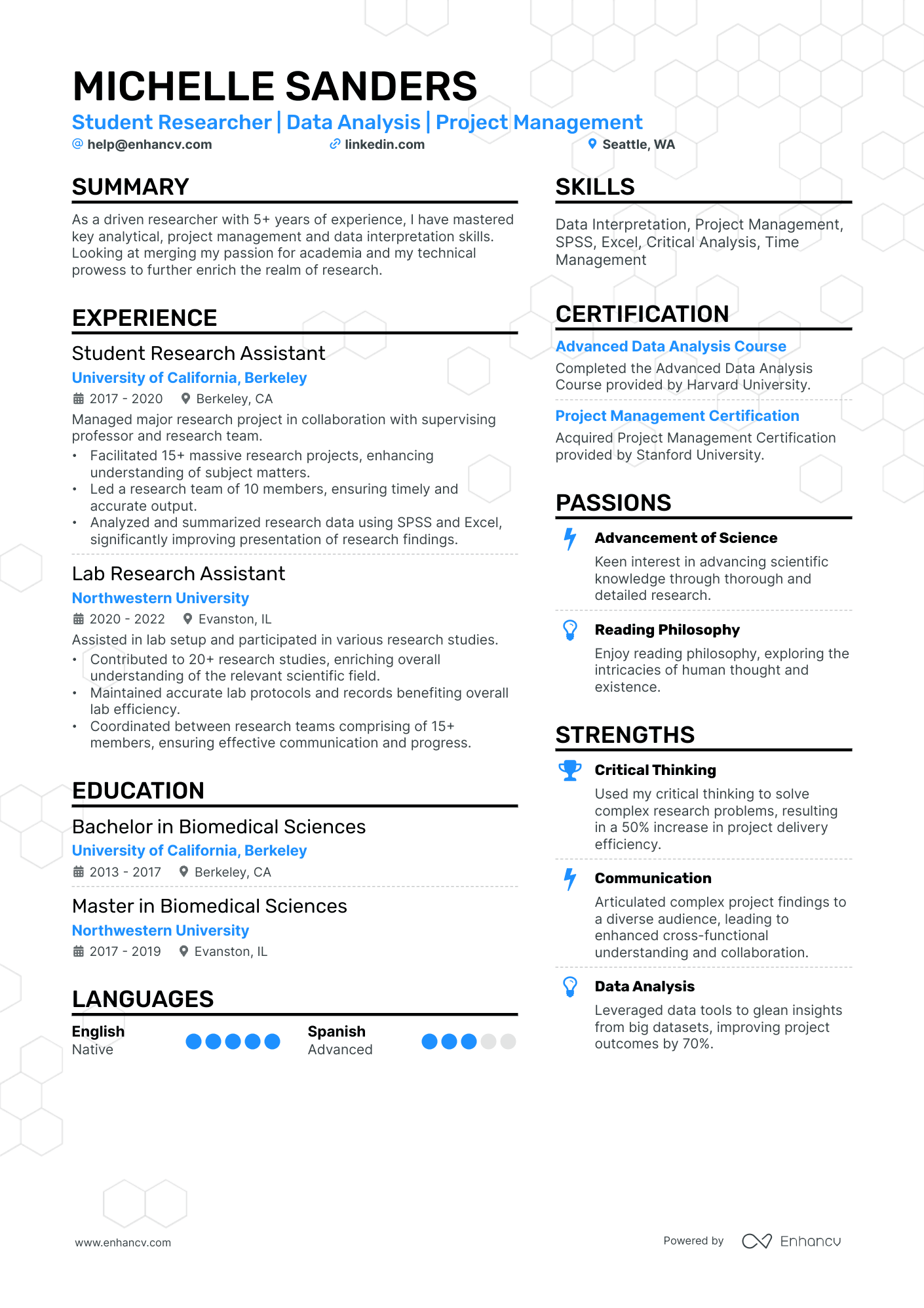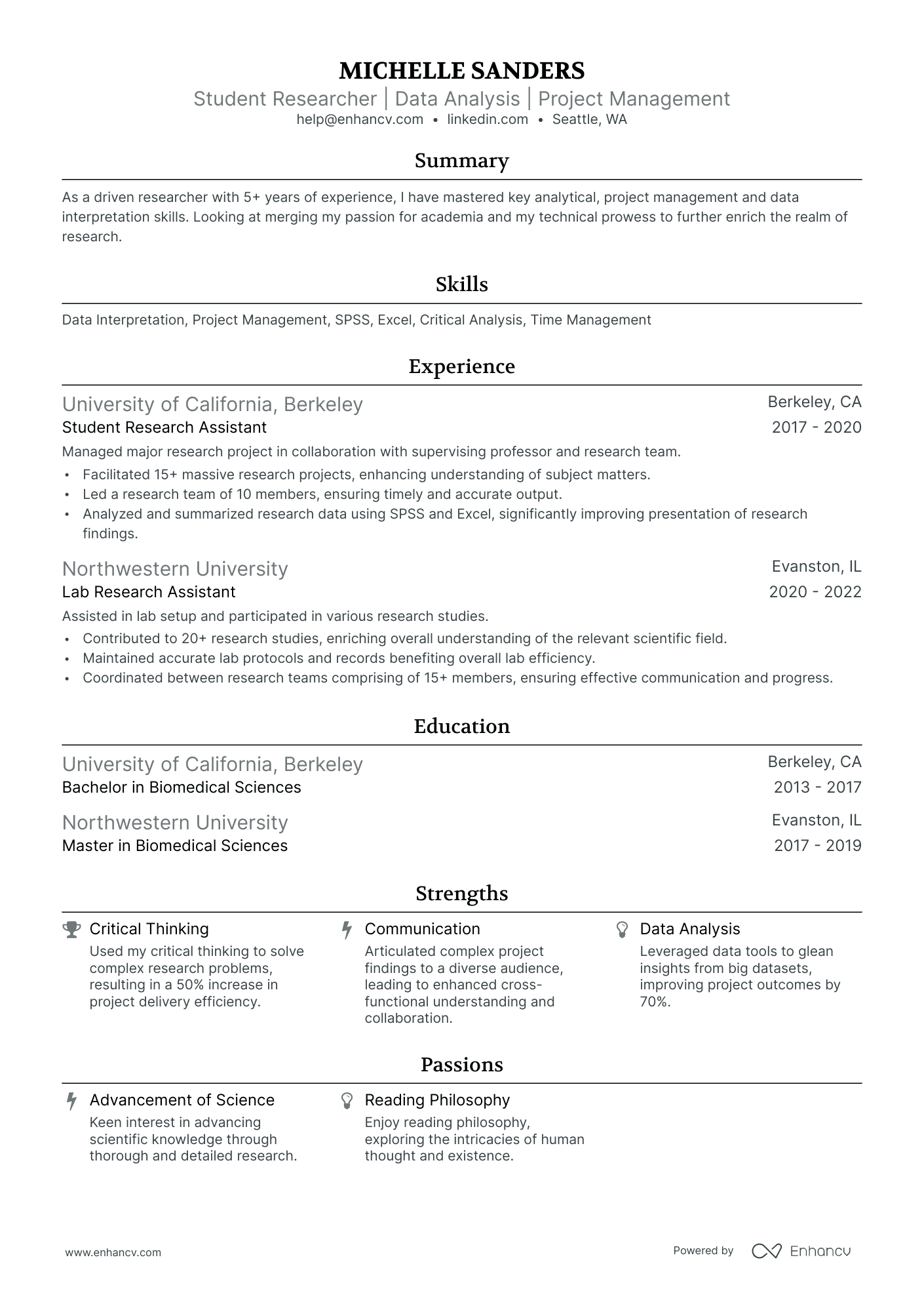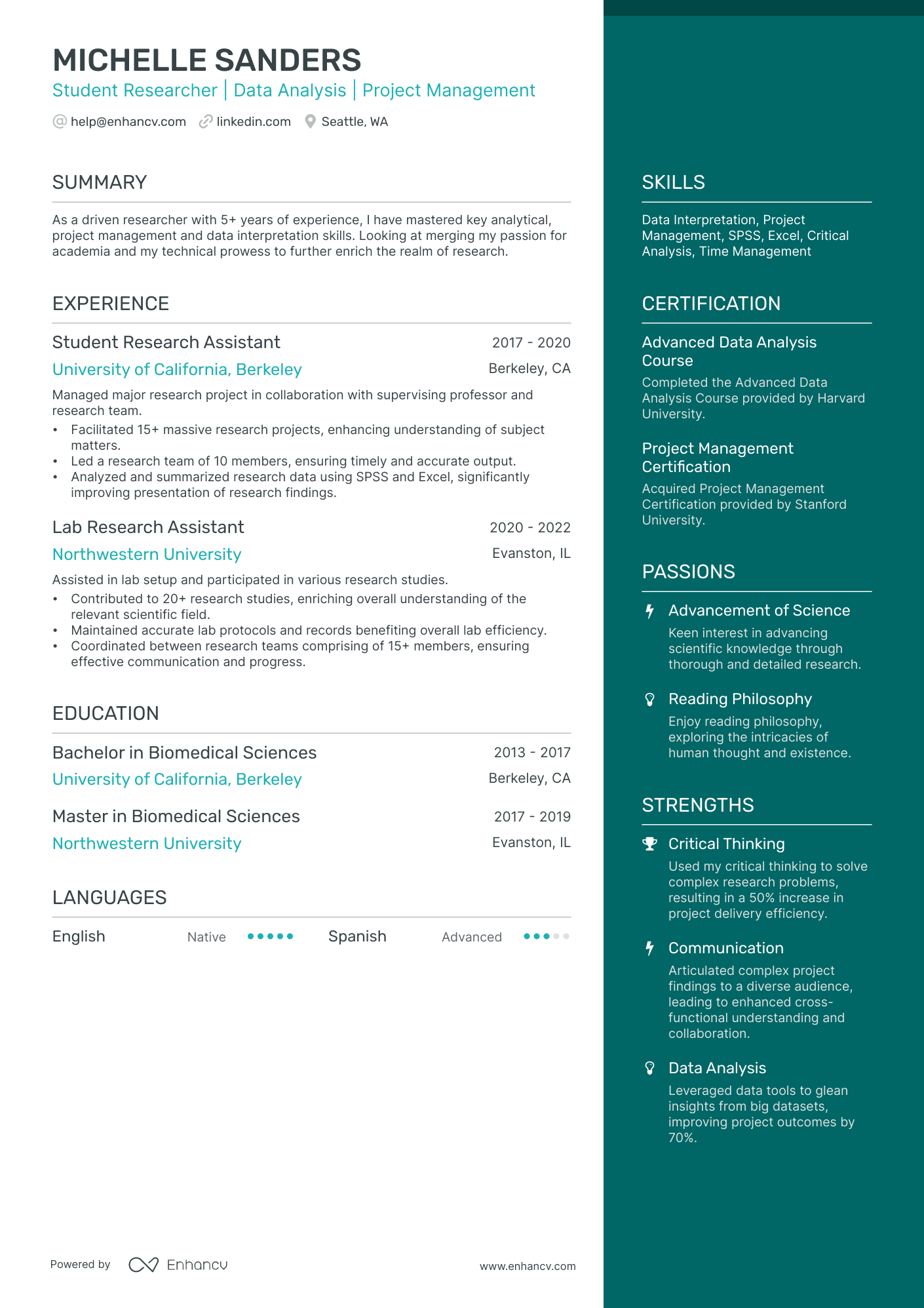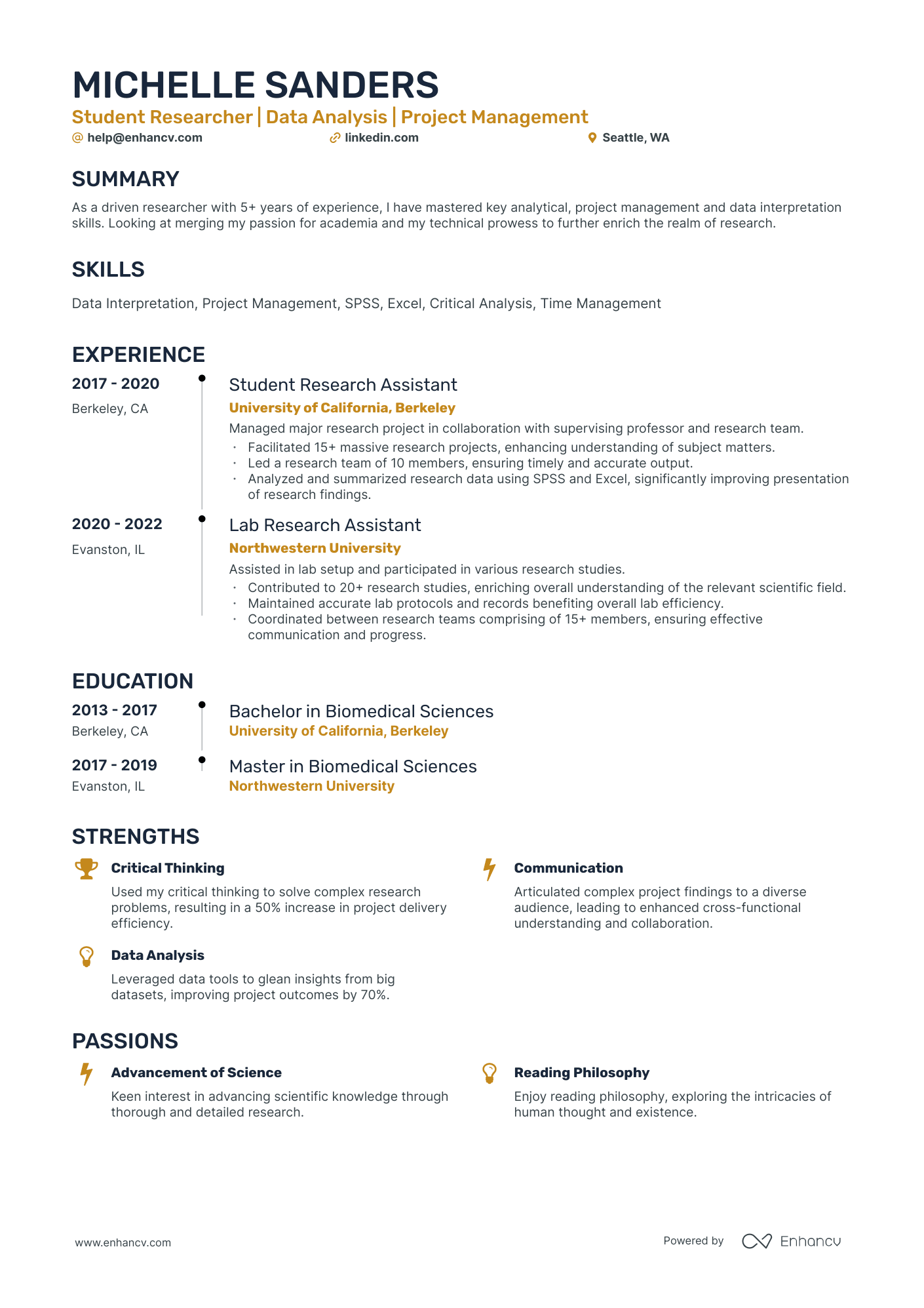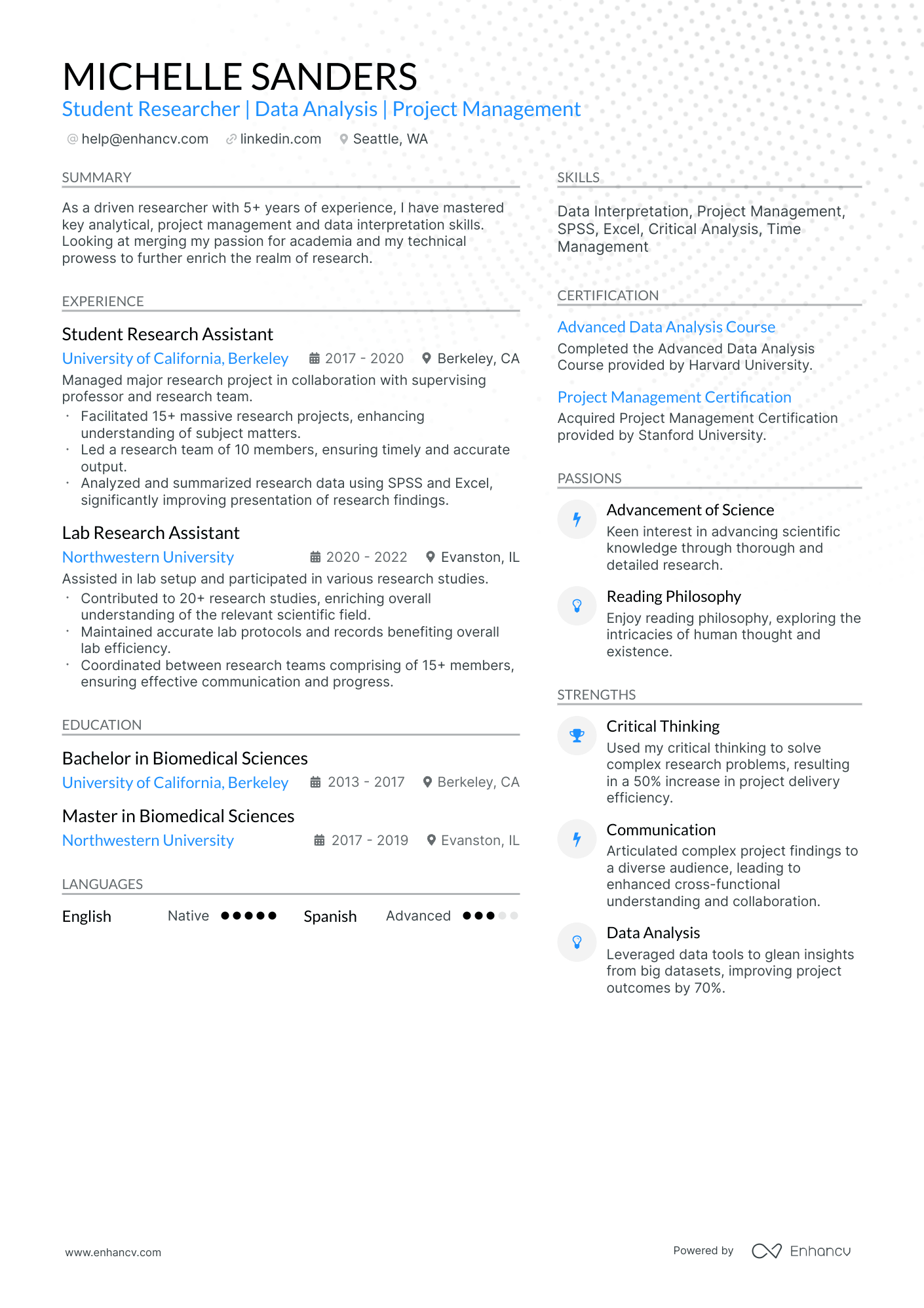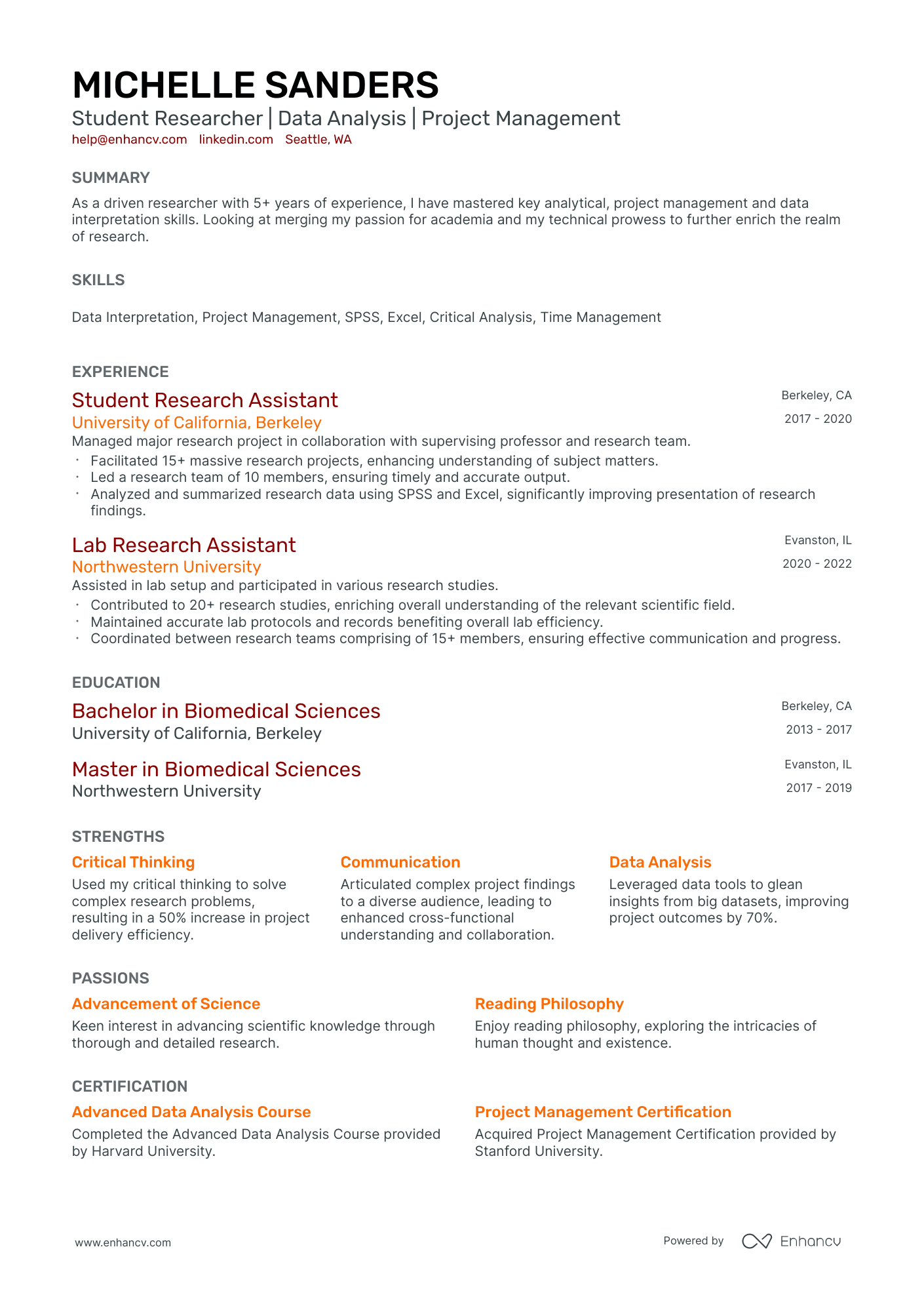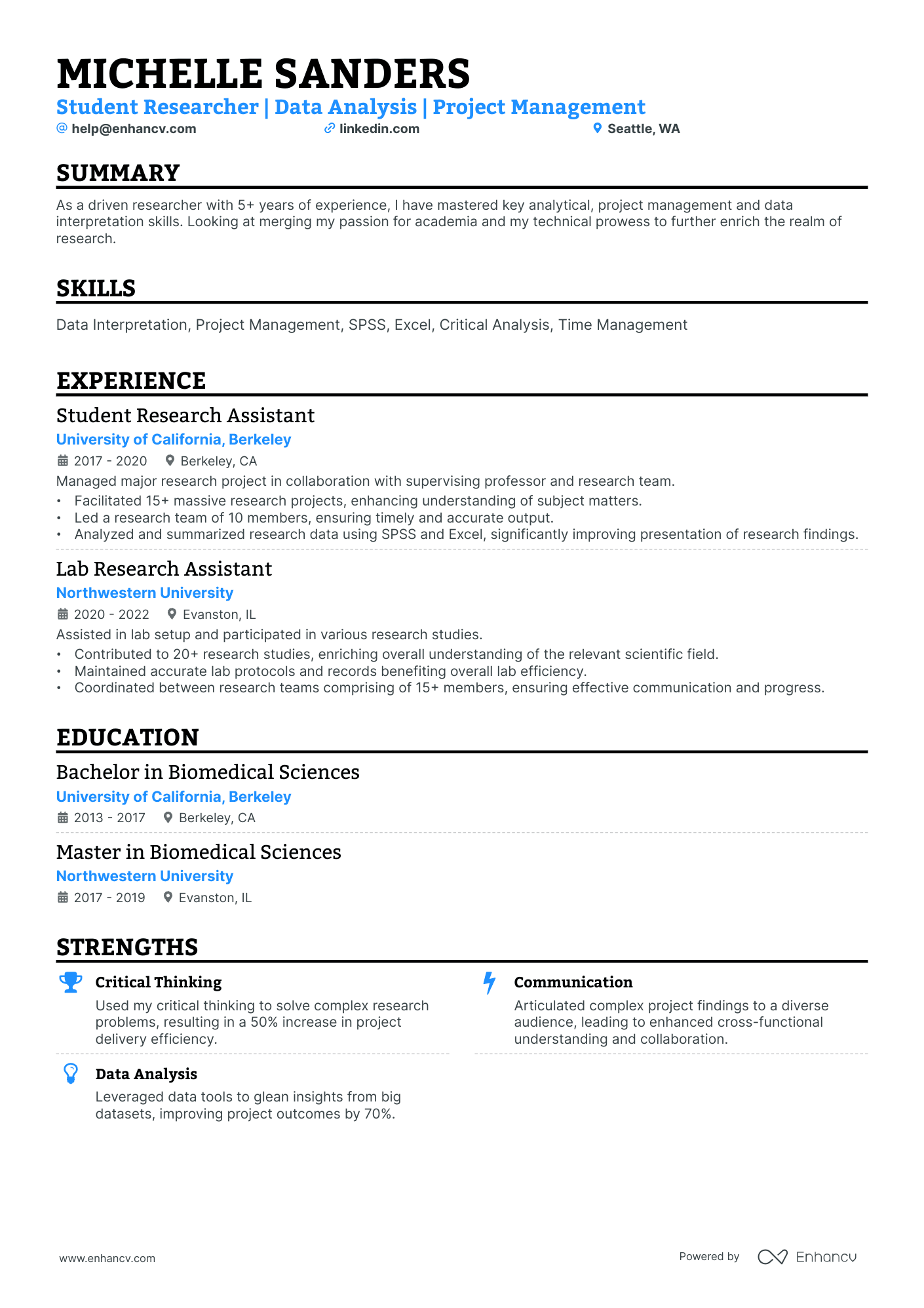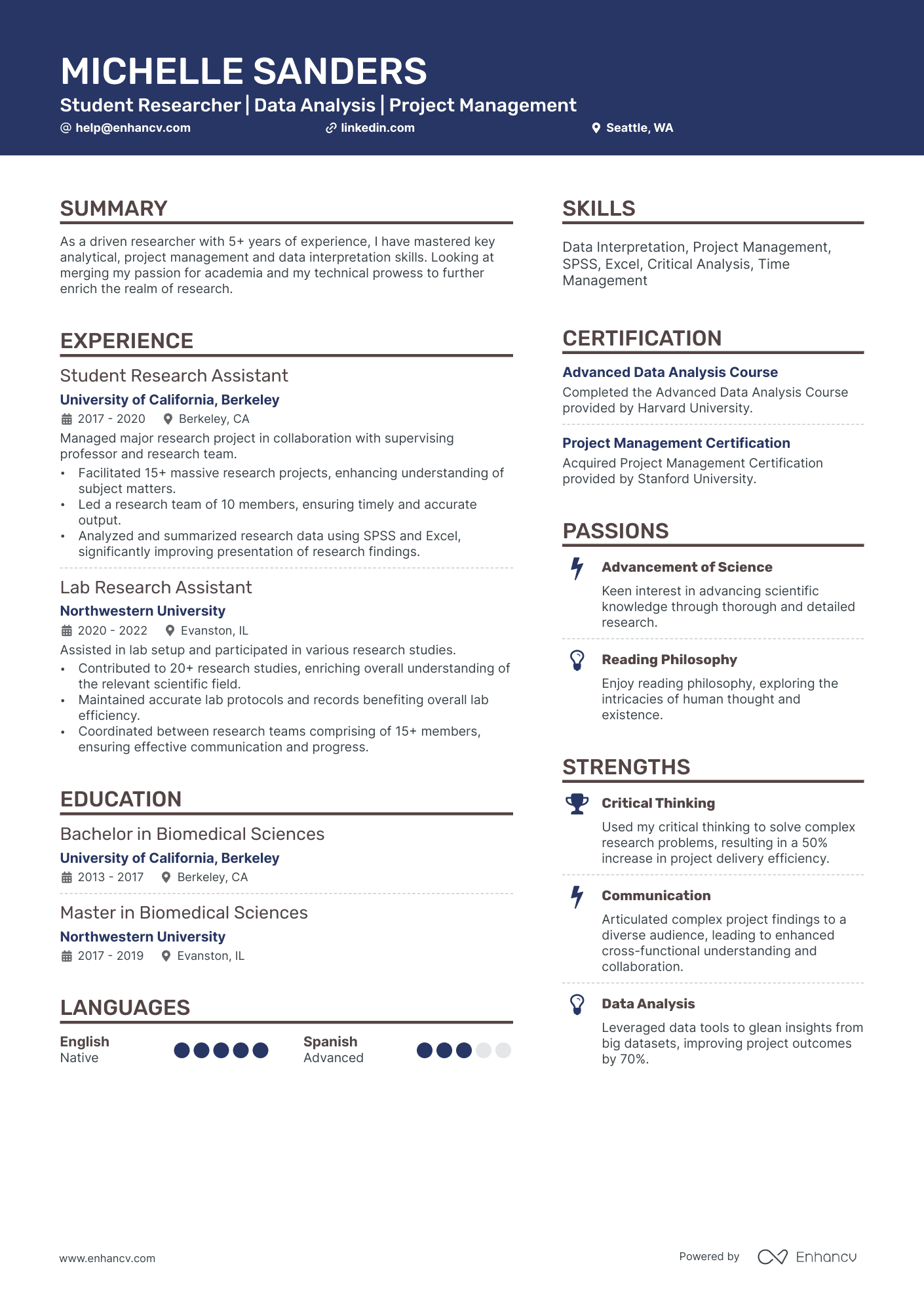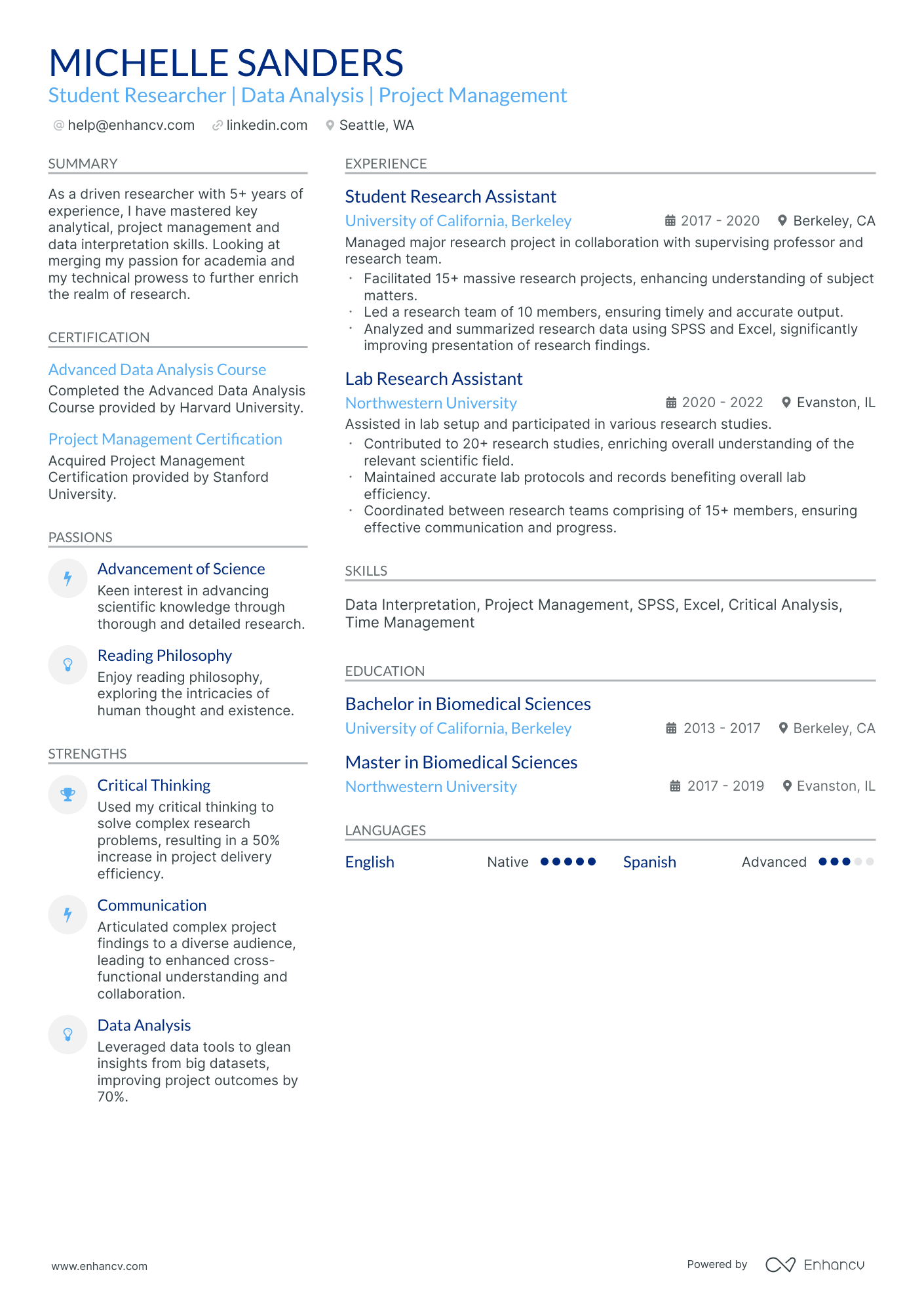A student researcher often faces the challenge of articulating their research experiences and findings in a concise and compelling way that appeals to potential employers outside academia. Our guide can help by offering tailored strategies on how to translate complex research jargon into clear, business-friendly language, ensuring your unique skills and experiences stand out on your resume.
Dive into this guide to discover how to craft a compelling student researcher resume:
- Explore top-tier student researcher resume samples, spotlighting industry-leading skills and experiences.
- Uncover over ten tailored strategies to make your student researcher resume resonate with the job description.
- Illuminate your unique value as a student researcher candidate, using your professional achievements as a guide.
- Debunk the myth that education doesn't matter, and learn how to leverage your academic and certification credentials effectively.
Recommended reads:
Deciphering the best format for your student researcher resume
To craft an impactful student researcher resume, start by thoroughly analyzing the job description.
Your chosen resume format should seamlessly align your experience with the role's requirements.
Consider these four pivotal elements:
- Present your experience effectively. If you boast a wealth of pertinent experience, employ the reverse-chronological resume format, listing roles by date, beginning with the most recent.
- Maintain brevity. Limit your resume to a maximum of two pages, focusing on your most salient attributes.
- Headers serve a purpose. A well-crafted header ensures recruiters can swiftly access your contact details and professional portfolio.
- Opt for PDF. Typically, submit your student researcher resume in PDF to preserve its layout. However, always adhere to specific job application guidelines.
Upload your resume
Drop your resume here or choose a file. PDF & DOCX only. Max 2MB file size.
Pro tip
At the end of the day, recruiters care most about how easily they can scan and read your resume layout. Unless you're aiming for a role in a creative field, it might be best to stick with a straightforward layout and format. Instead, put your energy into showcasing your experience.
To craft a compelling graduate research assistant resume, focus on these sections:
- A scannable header
- A snapshot of your professional persona, showcasing soft skills, achievements, and a summary or objective
- Skills that align with the job advert
- Quantifiable achievements in your experience section
- An education and technical skills section that underscores your proficiency with specific tools or software
What recruiters want to see on your resume:
- Research Experience: Relevant research projects and the methodologies you used, especially if they resulted in a publication or presentation.
- Technical Skills: Applicable software, laboratory techniques, statistical analysis tools, or other technical skills related to your field of study.
- Analytical Skills: Demonstration of your ability to analyze data, draw meaningful conclusions, and apply findings to solve problems.
- Collaboration and Communication: Examples of working in a team environment, particularly in a research setting, and your ability to clearly communicate complex ideas.
- Academic Achievements: High GPA, honors, relevant coursework, or scholarships that highlight your dedication to your field of study.
Recommended reads:
How to create the cornerstone experience section of your student researcher resume
A meticulously crafted student researcher resume experience section is a recruiter's delight. This segment not only responds to job criteria but also throws light on your technical expertise and character.
To craft an impactful experience section:
- Highlight roles directly related to the position in question.
- Pair each role or task with a metric that quantifies your achievements.
- Chronicle your student researcher career progression, illustrating your dedication and growth in the domain.
- For each role, elucidate challenges faced, strategies employed, and the broader organizational impact.
Examine the following student researcher samples to discern how seasoned professionals have articulated their experiences:
- Conducted data analysis and statistical modeling on a research project investigating the effects of climate change on crop yields, resulting in the identification of key factors influencing agricultural productivity.
- Assisted in designing and implementing experiments to evaluate the efficacy of new drug compounds for cancer treatment, contributing to the development of potential therapeutic options.
- Collaborated with a multidisciplinary team to develop and optimize algorithms for image processing in a computer vision research project, achieving a 25% improvement in accuracy.
- Conducted literature reviews and synthesized research findings on human psychology and behavior, providing valuable insights to support the development of a psychological intervention program.
- Assisted in collecting and analyzing field data for a biodiversity study, leading to the discovery of several endangered species and the formulation of conservation strategies.
- Contributed to the design and construction of a prototype renewable energy system, resulting in a 30% increase in energy efficiency compared to traditional systems.
- Developed and implemented machine learning algorithms for analyzing large-scale genomic data, enabling the identification of genetic markers associated with complex diseases.
- Collaborated with industry experts to design and conduct usability studies for a mobile application, resulting in a 20% improvement in user satisfaction and engagement.
- Assisted in the development of a robotic system for automated inspection and quality control in manufacturing processes, reducing defects by 15%.
- Conducted field surveys and data collection to assess the impact of urban development on bird populations, leading to recommendations for habitat conservation and restoration.
- Collaborated with a team to develop a mobile application for real-time air quality monitoring, resulting in increased public awareness and engagement in environmental issues.
- Analyzed geological samples using advanced microscopy techniques, contributing to the understanding of rock formation processes and the identification of mineral resources.
- Led a research project investigating the effects of nutritional interventions on cognitive function in aging populations, resulting in the publication of findings in a peer-reviewed journal.
- Designed and conducted experiments to evaluate the performance of novel materials for energy storage applications, leading to the development of high-capacity batteries with a 20% increase in energy density.
- Collaborated with industry partners to develop a computer vision system for autonomous vehicle navigation, achieving a 95% accuracy rate in object detection and recognition.
- Developed mathematical models and simulation algorithms to analyze the spread of infectious diseases, providing insights into the effectiveness of different control strategies.
- Assisted in the design and implementation of a remote sensing system for monitoring environmental pollution, enabling real-time data collection and analysis for early detection of contamination.
- Conducted experiments on material properties and performed structural analysis using finite element methods, contributing to the development of lightweight and high-strength materials.
- Assisted in conducting clinical trials for pharmaceutical drugs, ensuring compliance with protocols and ethical guidelines.
- Collected and analyzed survey data to assess public opinion on renewable energy sources, contributing to policy recommendations for sustainable energy development.
- Collaborated with engineers to develop a prototype wearable device for monitoring vital signs, resulting in accurate and reliable measurements for healthcare applications.
- Designed and implemented experiments to investigate the impact of microplastic pollution on marine ecosystems, leading to the identification of potential mitigation strategies.
- Developed a computer simulation model to analyze traffic flow patterns and optimize transportation systems, resulting in a 15% reduction in average commute time.
- Contributed to the development of a smart agriculture system integrating IoT sensors and data analytics, improving crop yield prediction accuracy by 20%.
- Supported data collection and analysis for a social science research project investigating the impact of socioeconomic factors on educational outcomes.
- Contributed to the development of a prototype robotic exoskeleton for rehabilitation purposes, enhancing mobility and facilitating physical therapy.
- Assisted in the design and execution of laboratory experiments to investigate the properties of nanomaterials, leading to potential applications in electronics and energy storage.
- Conducted field surveys and ecological assessments to evaluate the effectiveness of habitat restoration projects, resulting in improved biodiversity and ecosystem health.
- Collaborated with a team to develop an AI-powered chatbot for customer support, reducing response time by 50% and increasing customer satisfaction.
- Analyzed large-scale genomic datasets to identify genetic variants associated with disease susceptibility, providing insights into personalized medicine approaches.
Quantifying impact on your resume
<ul>
Tips for student researcher newcomers launching their careers
Lacking extensive experience for that student researcher role? No worries.
Sometimes, hiring managers go for the unexpected candidate when they see potential.
Here's how to convince them you're the right fit:
- Opt for the functional skill-based or hybrid formats to highlight your unique professional value.
- Always tailor your student researcher resume to emphasize the most critical requirements, usually listed at the top of the job ad.
- Compensate for limited experience with other relevant sections like achievements, projects, and research.
- In your student researcher resume objective, pinpoint both your achievements and how you envision your role in the position.
Recommended reads:
Pro tip
Highlight what sets your experience apart. Incorporate metrics, feedback, and the tangible value you've added to organizations. This specificity ensures your resume remains pertinent and memorable.
Essential student researcher resume skills
When recruiters review student researcher resumes, they're looking for a mix of technical know-how and personal attributes.
Technical skills demonstrate your proficiency in specific tools or tasks. They indicate if you're ready to jump into the role or if you'll need extensive training.
On the other hand, soft skills reflect your interpersonal abilities. They show how you'll fit into a team or company culture.
To effectively present these skills on your resume:
- Design a skills section that highlights both your technical and interpersonal strengths.
- Provide examples where you've applied these skills, such as projects or tasks.
- For soft skills, describe situations where they've been crucial to your success.
- Use metrics, like improved efficiency or positive feedback, to validate your skills.
For inspiration, explore the preferred skills of leading student researcher professionals.
Top skills for your student researcher resume:
Statistical Analysis Software (e.g., SPSS, R, Python)
Data Collection Techniques
Literature Review and Research Methodologies
Survey Design and Implementation
Qualitative Analysis Tools (e.g., NVivo, Atlas.ti)
Database Management (e.g., SQL, Excel)
Presentation Software (e.g., PowerPoint, Prezi)
Reference Management Software (e.g., EndNote, Zotero)
Laboratory Techniques (if applicable)
Field Research Skills
Critical Thinking
Communication Skills
Time Management
Team Collaboration
Problem-Solving
Adaptability
Attention to Detail
Organizational Skills
Creativity
Ethical Judgment
Pro tip
If the job emphasizes team or organizational culture, dedicate a section of your resume to underscore your strengths and achievements. Top-tier student researcher candidates also highlight their alignment with a company's values and culture.
Student researcher resume: certifications and education
Boost your student researcher resume by:
- Featuring recent and relevant certificates.
- Listing basic details: certificate name, school, and dates.
- If you lack experience, highlight skills from your education.
- Only include valid license numbers if needed.
Job ads often list desired education and certificates. Match these with top industry certificates.
Best certifications to list on your resume
- SAS Base Programmer Certification (BPC) - SAS Institute
Pro tip
The reputation of the institution or organization granting your certification or degree can bolster your credibility. Prioritize recognized and respected credentials.
Recommended reads:
Deciding between a student researcher resume summary or objective
While some argue the resume summary or objective is outdated, these sections can effectively:
- Integrate pivotal student researcher keywords.
- Showcase your achievements.
- Clarify your motivation for applying.
The distinction lies in their focus:
- A resume objective emphasizes your career aspirations.
- A resume summary spotlights your career milestones.
Opt for a summary if you have a rich experience you wish to highlight immediately. Conversely, an objective can be ideal for those wanting to underscore their aspirations and soft skills.
For inspiration, we've curated samples from industry professionals to guide your resume summary or objective crafting:
Resume summary and objective examples for a student researcher resume
Additional sections to elevate your student researcher resume
To further differentiate your student researcher application, consider adding sections like:
- Publications
- Projects
- Awards
- Hobbies (only if they align with the job or showcase relevant skills).
These sections can further demonstrate your technical acumen and interpersonal skills.
Key takeaways
- A clear resume layout helps present your info well.
- Use all main resume sections to show how you fit the job.
- Detail specific skills or tasks and their impact.
- Show your personality through interests or hobbies.
- List certifications to back up your technical skills.
